Overview
The role of ADA professionals is vital in fostering compliance with the Americans with Disabilities Act, which seeks to eliminate discrimination and enhance accessibility for individuals with disabilities in various sectors. Their responsibilities are significant and include:
- Conducting accessibility assessments
- Providing training
- Advocating for inclusive practices
These efforts are crucial, as they not only improve health equity but also cultivate a culture of respect and inclusion in our society.
It's understandable to feel overwhelmed by the complexities of these responsibilities. However, the impact of ADA professionals is profound, as they work tirelessly to create environments where everyone feels valued and respected. Their dedication to promoting accessibility can inspire hope and drive change, encouraging us all to advocate for a more inclusive world.
You're not alone in this journey. Together, we can support the efforts of ADA professionals and strive for a society that embraces diversity and accessibility for all.
Introduction
In our journey towards inclusivity, the Americans with Disabilities Act (ADA) serves as a vital cornerstone of civil rights, advocating for the rights of individuals with disabilities since its enactment in 1990. This important legislation has transformed into a comprehensive framework that addresses various forms of discrimination, ensuring equal access in areas such as employment, transportation, and public accommodations.
As the landscape of disability advocacy evolves, the role of ADA professionals becomes increasingly essential, especially in healthcare and education. It's understandable to feel overwhelmed by the pressing need for compliance and the ongoing challenges faced by individuals with disabilities.
Therefore, grasping the nuances of the ADA and the responsibilities of those who uphold it is crucial. This article explores the multifaceted impact of the ADA, the essential functions of ADA professionals, and the collaborative efforts necessary to nurture an equitable society for everyone.
Remember, you are not alone in this journey; we are here to support you every step of the way.
Overview of the Americans with Disabilities Act (ADA)
The Americans with Disabilities Act (ADA), established in 1990, is a vital civil rights statute dedicated to eliminating discrimination against individuals with impairments in various aspects of public life, including employment, transportation, public accommodations, and telecommunications. Its primary goal is to ensure that people with disabilities enjoy the same rights and opportunities as their peers, fostering a sense of equal access and inclusion in society.
The ADA is structured into five titles, each addressing distinct types of discrimination and accessibility concerns, establishing a robust framework for protecting the rights of individuals with disabilities. As we approach 2025, the importance of ADA compliance has become increasingly evident. Recent statistics reveal that approximately 4 million people reside in institutions, with over 2.1 million (52.7%) of these individuals living with a condition. This highlights the urgent need for inclusive health programs and research initiatives aimed at enhancing the health and well-being of people with disabilities. Organizations like T2DSolutions echo this mission, striving to create a supportive community for those affected by diabetes.
T2DSolutions is dedicated to empowering individuals, families, and healthcare providers with the knowledge and resources necessary to effectively manage Type 2 and Type 3 diabetes. By aligning with the ADA's principles, T2DSolutions underscores the significance of accessibility and community support in diabetes education. The organization offers a wide range of resources, including practical tips for daily diabetes management, comprehensive guides on medications and therapies, and inspiring personal stories from those living with diabetes.
The successful implementation of ADA professional compliance within organizations has demonstrated significant benefits, not only in improving accessibility but also in cultivating a culture of inclusivity. As John Lancaster, Executive Director of the President's Committee on Employment of People with Disabilities, notes, "If you don't have a case-by-case basis, you have a real problem, and possibly reinforce stereotypes and misconceptions." This statement emphasizes the importance of a tailored approach to ADA adherence, particularly in healthcare settings where the CDC and its collaborators aim to enhance health outcomes for individuals with disabilities.
Key provisions of the ADA, such as reasonable accommodations and effective communication, are essential for creating environments where individuals with limitations can thrive, as highlighted by ADA professionals. Recent reports bring attention to ongoing efforts to tackle accessibility issues, especially in the digital realm. The 2024 WebAIM Accessibility Report revealed an average of 83.3 accessibility issues across retail websites, an alarming statistic that calls for immediate action to improve user experiences for those facing challenges. This reinforces the critical role of ADA professionals in today’s digital landscape and their implications for diabetes education resources.
As we move forward, updates to the ADA in 2025 continue to reflect the evolving needs of society, ensuring that the rights of individuals with challenges are upheld. Case studies illustrate the profound impact of the ADA on public life, demonstrating how compliance leads to increased participation and representation of individuals with disabilities across various sectors. The collective insights from experts in the field further affirm that the ADA remains a cornerstone of civil rights, advocating for a society where everyone, regardless of ability, can access opportunities and resources equitably.
T2DSolutions is here to be a comprehensive resource for those navigating the complexities of diabetes management, ensuring that everyone has the support they need to thrive. You're not alone in this journey, and we are here to support you every step of the way.
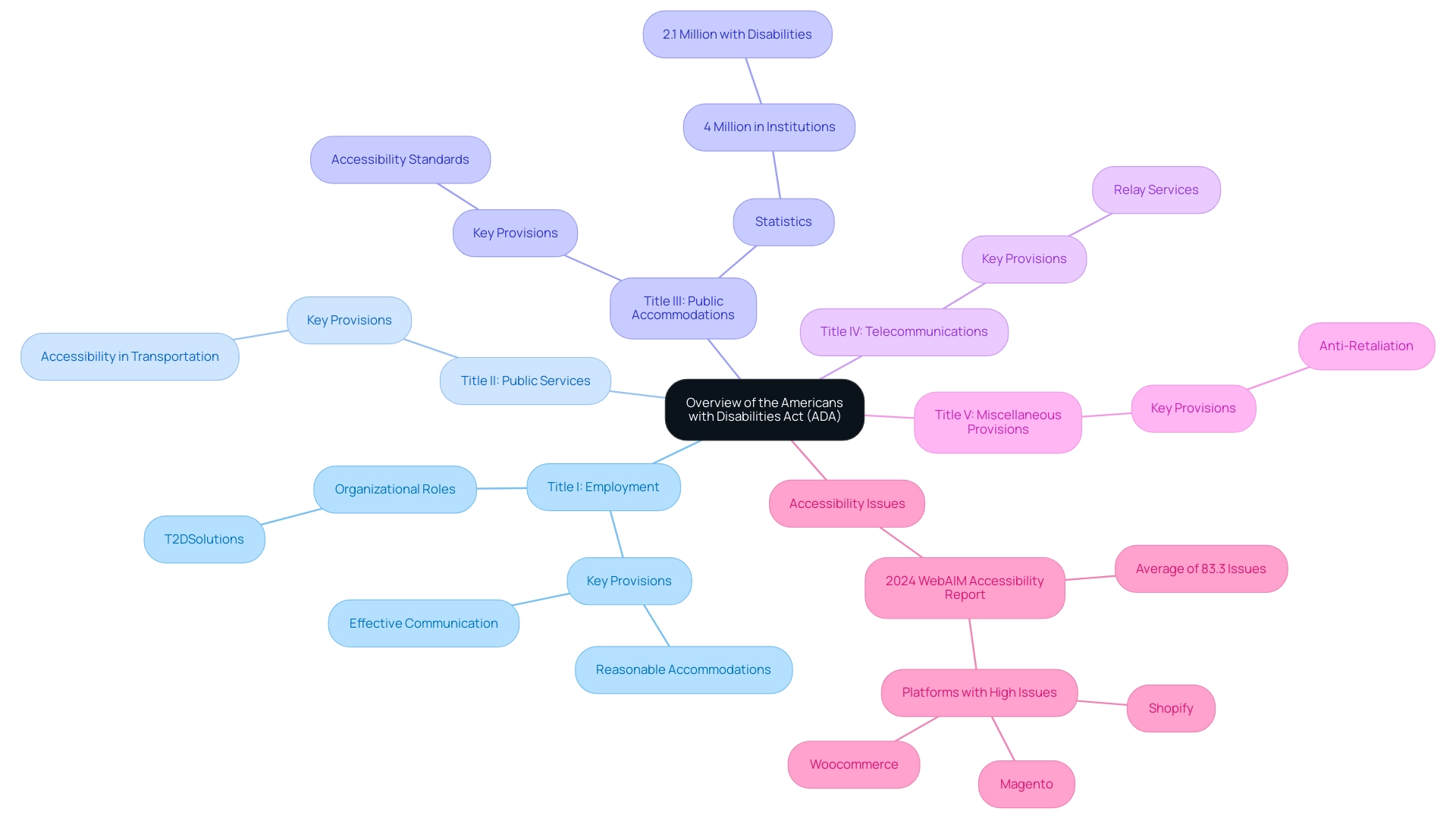
Key Responsibilities of ADA Professionals
T2DSolutions is emerging as a vital resource hub for diabetes education, especially for those who are newly diagnosed. The ADA experts play an essential role in ensuring that organizations comply with the Americans with Disabilities Act (ADA) regulations, particularly for individuals managing diabetes. Their responsibilities encompass a range of critical tasks aimed at fostering inclusivity and accessibility.
Key duties include:
- Conducting thorough accessibility assessments to identify barriers.
- Developing and implementing policies that promote an inclusive environment.
- Providing comprehensive training to staff on ADA requirements.
This training is crucial, as studies indicate that approximately 60% of organizations lack adequate ADA compliance training programs. This highlights a significant area for improvement, and it’s understandable to feel concerned about compliance in your own journey.
In the context of diabetes management, ADA professionals can support individuals by addressing specific accessibility challenges they may encounter in healthcare settings and workplaces. For instance, T2DSolutions exemplifies how organizations can empower people with diabetes by providing knowledge and resources that facilitate better management of their condition. T2DSolutions also offers a subscription option for updates, enabling individuals to stay informed about new resources and content that will be available.
ADA experts are crucial assets for individuals seeking accommodations. They handle complaints related to discrimination and work diligently to resolve issues, ensuring that individuals with impairments receive the necessary support to participate fully in society. This dedication to advocacy is underscored by the fact that businesses can deduct expenses related to removing obstacles for individuals with impairments, with potential yearly deductions reaching up to $15,000.
The role of ADA professionals is increasingly critical as we approach 2025, as organizations recognize the importance of compliance not only for legal reasons but also for fostering a diverse and equitable workplace. Successful ADA training programs have been implemented in various organizations, demonstrating the effectiveness of these initiatives in promoting understanding and adherence to ADA standards. As Courtney Mullin states, "While choosing to take legal action is a complex decision, it is a powerful way for individuals with impairments to respond to discrimination."
By prioritizing ADA compliance, organizations not only fulfill their legal obligations but also contribute to a culture of respect and inclusion, ultimately benefiting everyone involved. Remember, you’re not alone in this journey; there are resources and support available to help you navigate these challenges.
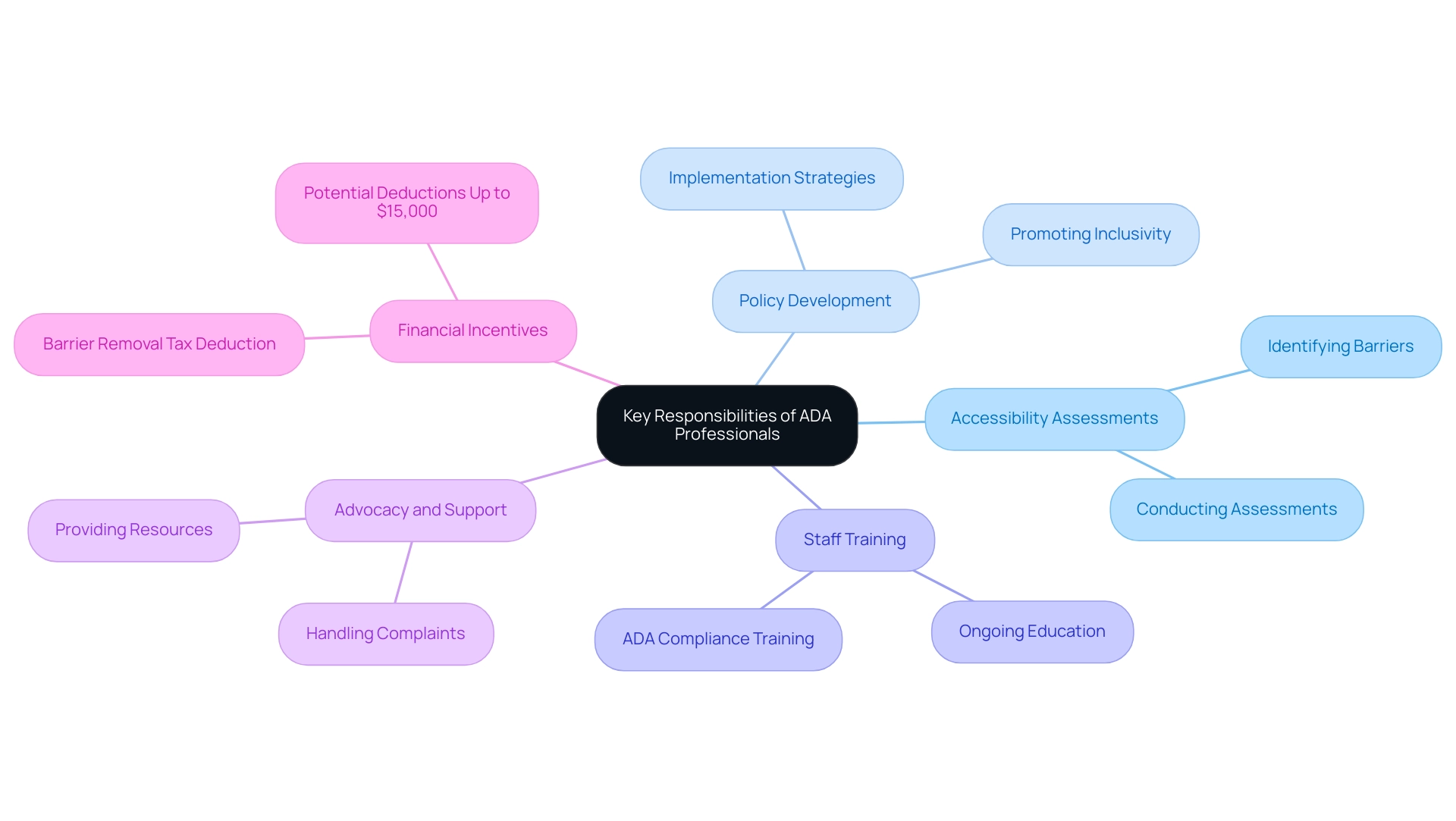
ADA Professionals Across Different Sectors
Ada professionals play a crucial role across diverse sectors, including healthcare, education, government, and private industry. In the healthcare sector, they ensure that medical facilities comply with accessibility standards, which is essential for allowing individuals with impairments, including those with diabetes, to obtain the necessary care. This compliance not only improves patient experiences but also fosters health equity, enabling everyone to access essential health services without obstacles.
In educational environments, ada professionals advocate for students with challenges, ensuring they have equal access to educational resources and assistance. Their efforts are pivotal in creating inclusive learning environments where every student can thrive. Many educational institutions are increasingly adopting ADA compliance measures, with reports indicating significant improvements in accessibility rates.
By 2025, adherence rates in the education sector have shown a significant rise, reflecting a growing dedication to inclusivity.
Government agencies also rely on ada professionals to enforce policies that protect the rights of individuals with impairments in public services. These experts are essential in shaping legislation and practices that foster an inclusive society. The influence of ada professionals in education and healthcare is profound, as they not only assist with compliance but also promote systemic changes that benefit those with challenges.
Statistics reveal that in the healthcare sector, a considerable portion of the workforce is committed to supporting individuals with challenges. For example, in the District of Columbia, over 17,000 workers, or 4 out of 100, are engaged as healthcare providers, underscoring the importance of skilled experts in enhancing accessibility and assisting individuals with diabetes.
As Lynda Laughlin observed, California had 718,011 healthcare support workers, representing about 4 out of 100 workers in the state. This highlights the vital role of trained specialists in diabetes management.
Case studies, such as the CDC's Disability and Health Programs, demonstrate the effectiveness of ADA specialists in enhancing the quality of life for those with limitations, including those with diabetes. These programs focus on raising awareness of inclusion for individuals with impairments and addressing health inequalities, ensuring that participants can engage fully in their communities and access the necessary healthcare and support.
Moreover, it is crucial for authorities and health sector collaborators to consider health equity for individuals with impairments in all health initiatives, including diabetes education and management. Overall, the role of ada professionals is vital in both education and healthcare, as they navigate unique challenges and opportunities to significantly impact the lives of those they serve. Their dedication to fostering an inclusive atmosphere is essential for achieving better health outcomes and educational achievements for those with challenges. Remember, you're not alone in this journey, and we are here to support you every step of the way.
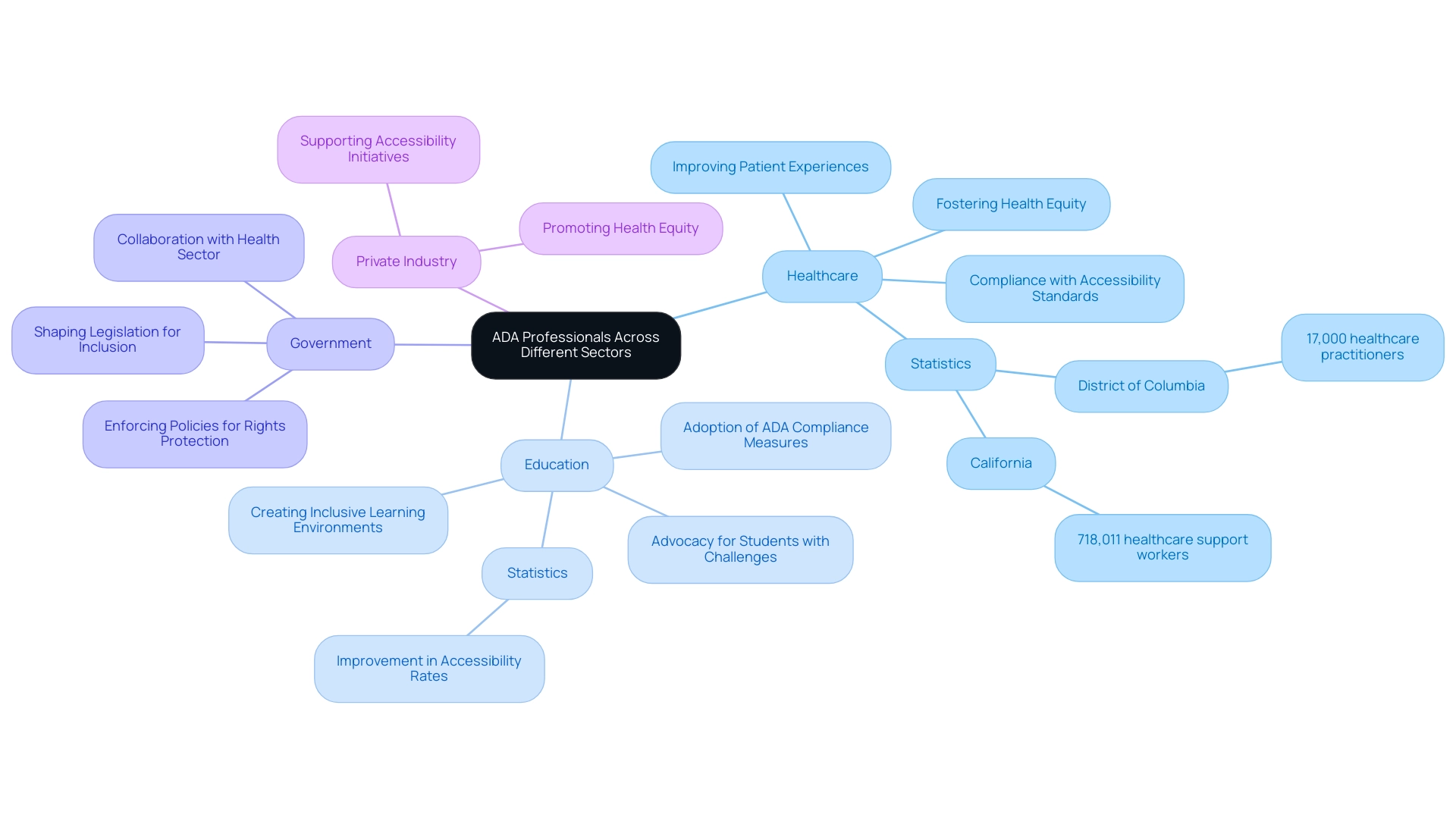
Challenges and Barriers in ADA Professional Practice
ADA specialists encounter numerous challenges in their practice, largely due to the complex landscape of regulations and the varied needs of individuals with disabilities. One significant hurdle is the resistance from stakeholders who may not fully grasp the critical importance of compliance with the Americans with Disabilities Act (ADA). It's understandable to feel that this lack of understanding can lead to insufficient support for necessary initiatives.
Moreover, limited resources and funding often hinder the ability of ADA experts to implement essential changes effectively. This creates substantial obstacles in their mission to promote inclusivity and accessibility, which is so vital for everyone involved.
As we look to 2025, the landscape remains challenging. Statistics indicate that nearly 67% of lawsuits related to ADA compliance target companies with annual revenues under $25 million. This highlights the pressing need for small businesses to navigate compliance effectively, often without the necessary resources. Additionally, the ongoing evolution of workplace dynamics, including the rise of remote work and digital platforms, necessitates that ADA specialists adapt their strategies to ensure accessibility in these new environments.
It's important to note that 71 million Baby Boomers increasingly rely on accessible digital experiences, underscoring the growing demand for compliance across various sectors. This is a call to action for all of us.
Expert opinions emphasize the significance of strategic advocacy and collaboration among ADA professionals. By fostering partnerships with stakeholders and leveraging community resources, ADA professionals can better address the complexities of compliance. The proliferation of artificial intelligence in the workplace is expected to increase productivity and efficiency, potentially paving the way for innovative solutions, such as the four-day workweek.
Case studies reveal that organizations prioritizing ADA compliance not only enhance their reputation but also experience increased employee satisfaction and retention. For instance, those who openly share their challenges often report higher job satisfaction, indicating that a supportive environment can lead to improved outcomes for both employees and employers.
Despite the barriers, numerous examples of successful initiatives have emerged. By implementing specialized training programs and creating accessible job application processes, organizations can significantly improve their compliance efforts. Such proactive measures not only fulfill legal obligations but also contribute to a culture of inclusivity, ultimately benefiting everyone involved.
Furthermore, insights from the case study titled "Responses to Discrimination" illustrate the complexities individuals with disabilities face and the importance of supportive environments in fostering a more inclusive workplace. Remember, you're not alone in this journey, and there are resources available to help navigate these challenges together.
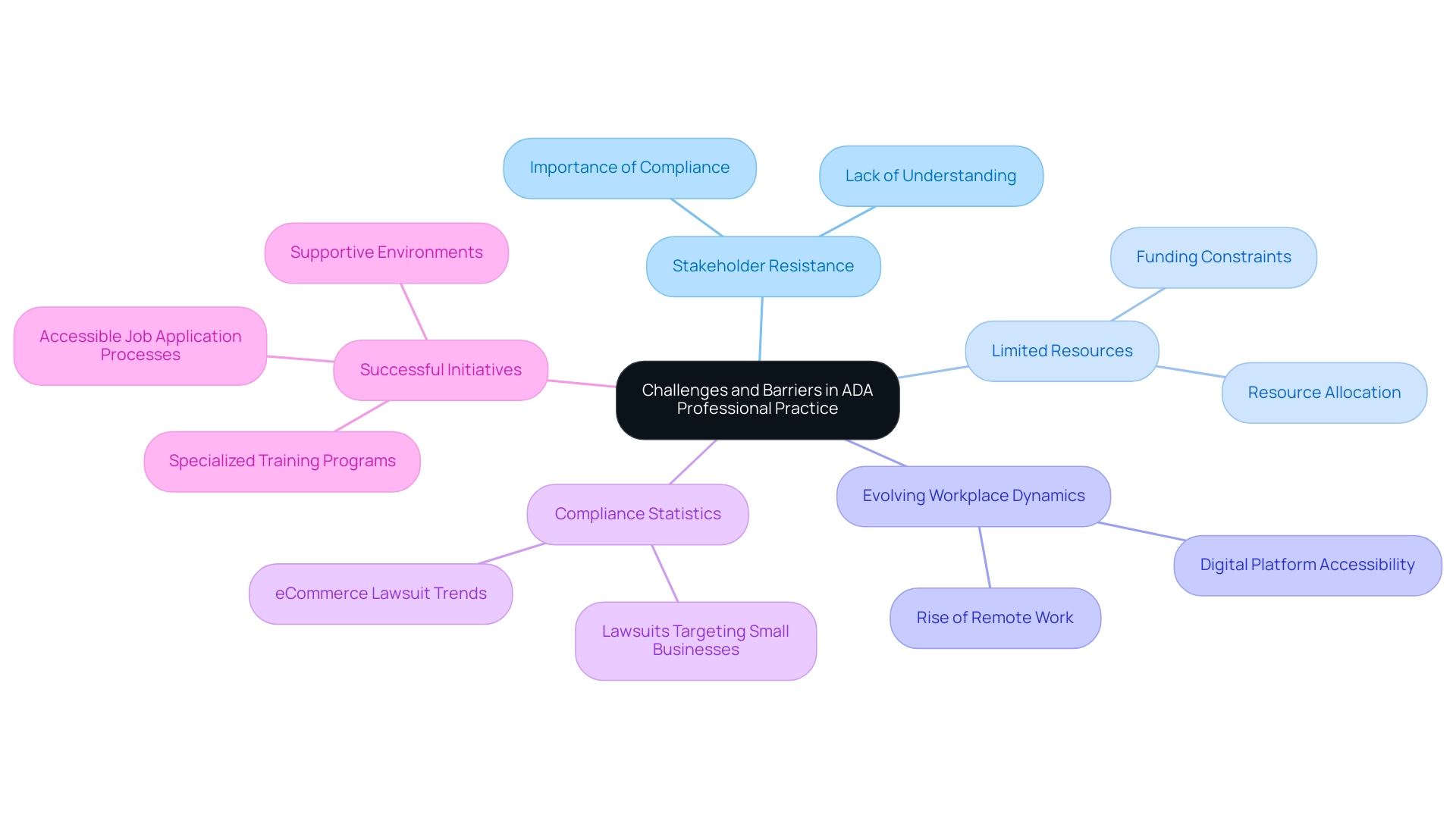
The Importance of Continuous Education for ADA Professionals
Continuous education is essential for ADA professionals, as it helps them stay informed about legislative changes, emerging best practices, and innovative technologies that enhance accessibility. By engaging in regular training sessions, workshops, and conferences, professionals not only share knowledge and network with peers but also ensure they are well-prepared for the latest developments in the field. This commitment to lifelong learning significantly enhances their skills and empowers them to advocate effectively for individuals facing challenges.
As Kenneth D. Nibali, Associate Commissioner for Impairment at the Social Security Administration, noted, "Once you’re on the [Social Security assistance] rolls, the vast majority of individuals remain there for quite some time." This observation highlights the importance of continuous learning in equipping individuals to assist those with challenges throughout their lives.
Statistics show that ongoing education correlates with improved compliance rates among ADA professionals. Individuals who are equipped with updated knowledge are better prepared to implement necessary changes. For example, the Gregory S. Fehribach Center has successfully facilitated 184 internships for 101 students with disabilities, demonstrating the positive outcomes of targeted training and support. The center's dedication to expanding partnerships with Indiana employers and developing educational programming for high school students further emphasizes the critical role of continuous education in fostering career opportunities and community engagement.
In 2025, the landscape of training opportunities for ADA specialists continues to evolve, offering a variety of effective programs designed to enhance compliance and advocacy skills. These programs not only address current challenges but also prepare individuals for future advancements in the field. Experts agree that investing in education is vital for ADA professionals, as it empowers them to serve their communities better and cultivate a culture of inclusivity.
By emphasizing ongoing learning, ADA experts can profoundly impact the lives of individuals facing challenges, ensuring that their rights and needs are adequately represented and addressed. Remember, you're not alone in this journey; continuous education is a step toward a more inclusive future.
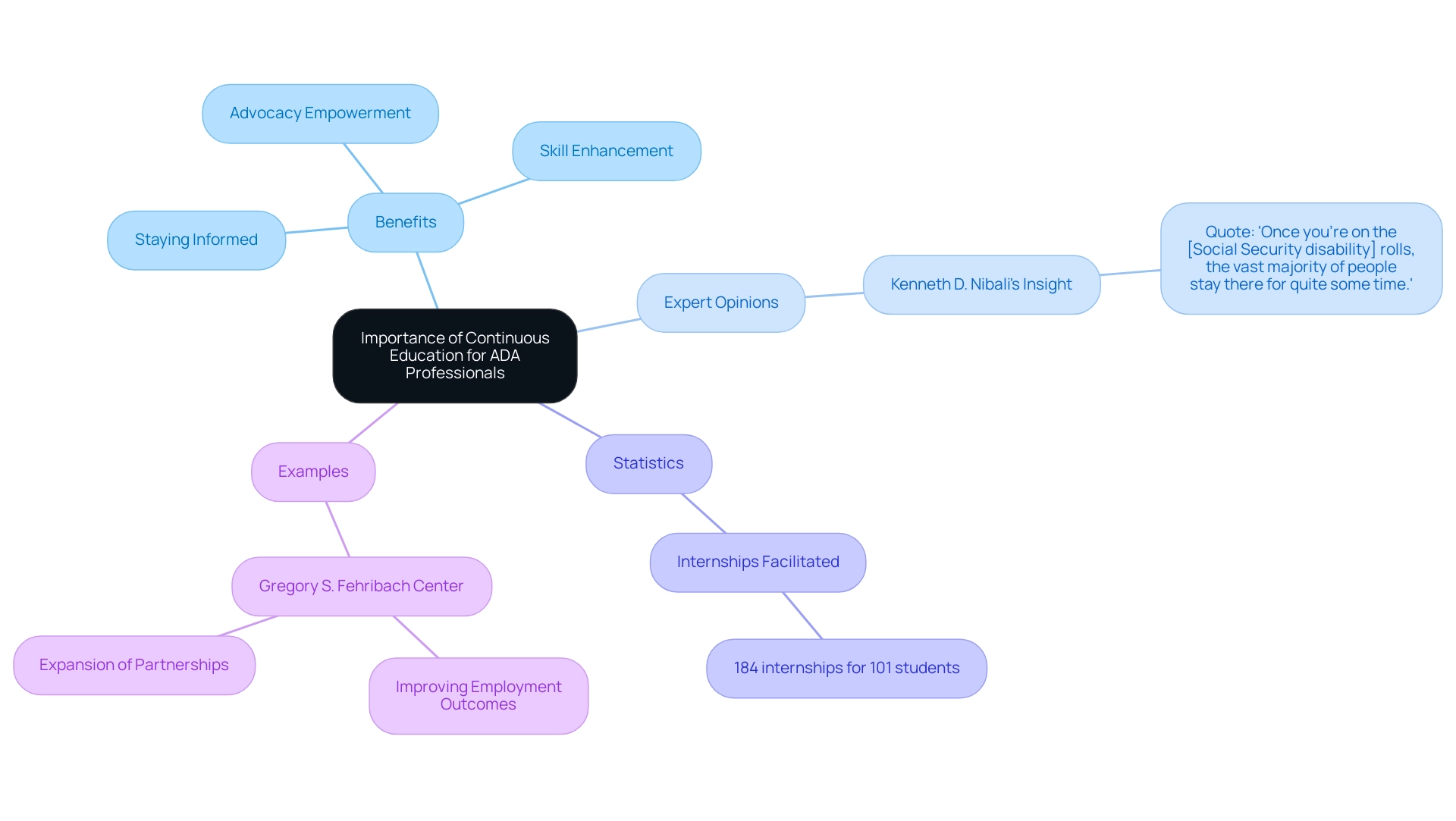
Collaboration and Advocacy: Working Together for Disability Rights
Cooperation among ADA experts, healthcare practitioners, educators, and community groups is vital in promoting the rights of those with impairments and ensuring comprehensive assistance for individuals facing challenges. By uniting their efforts, these stakeholders can effectively share resources, knowledge, and best practices, fostering more inclusive environments. This collaborative approach not only enhances the effectiveness of ADA compliance efforts but also nurtures a sense of community and shared responsibility in supporting people with impairments.
Recent statistics emphasize the importance of collaboration. Research indicates that groups of 3 to 5 members are particularly effective in resolving complex issues, which is essential when addressing the intricate challenges faced by those with impairments. Additionally, video conferencing has been shown to reduce the average length of treatment to 6.0 days, compared to audio conferencing at 10.2 days. This highlights the significance of effective communication tools in healthcare settings, ensuring that individuals receive timely support.
Successful advocacy efforts for the rights of individuals with disabilities often arise from the collective action of diverse voices. Participation in intervention programs, for example, has been linked to increased audit activity, with 9 of the 11 teams reporting improvements to care, as noted by Calland (2011). These collaborative initiatives not only raise awareness of rights for individuals with disabilities but also empower individuals and communities to advocate for their needs. You're not alone in this journey; together, we can make a difference.
In 2025, advocacy strategies are evolving to foster more robust partnerships among ADA professionals and community organizations, thereby enhancing the reach and impact of rights initiatives for individuals with disabilities. By sharing insights and experiences, these collaborations can lead to innovative solutions and a stronger collective voice in the fight for disability rights. Furthermore, the rise of online collaboration tools has been shown to increase productivity by 30%. However, many employees find these tools challenging to navigate, emphasizing the need for ongoing training and support to utilize such technologies effectively. We are here to support you every step of the way.
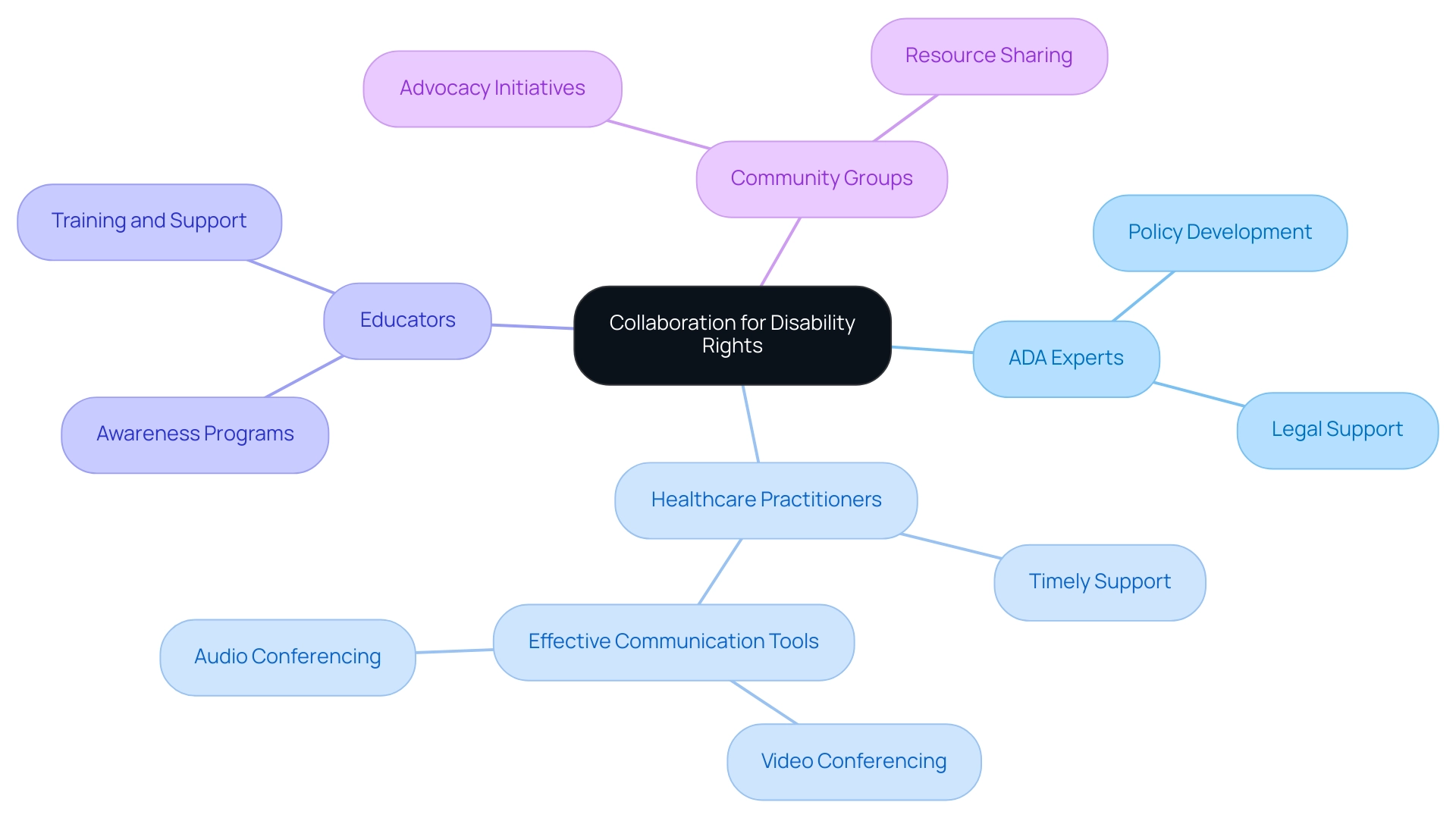
Conclusion
The Americans with Disabilities Act (ADA) has played a pivotal role in promoting equal rights and inclusivity for individuals with disabilities since its enactment in 1990. This article shines a light on the essential work of ADA professionals, who not only ensure compliance but also advocate for necessary accommodations across various sectors, including healthcare and education. Their dedication to conducting accessibility assessments and training staff is crucial for creating environments where individuals with disabilities can truly thrive.
It's understandable that ADA professionals face challenges, such as resistance from stakeholders and limited resources. Yet, their commitment to driving systemic change remains unwavering. Collaboration among these professionals, healthcare providers, educators, and community organizations is vital for advancing disability rights and enhancing the effectiveness of compliance initiatives.
Ongoing education is essential for ADA professionals to remain informed about legislative changes and best practices. By prioritizing continuous learning, they can better navigate the evolving challenges in accessibility and inclusion.
In summary, the journey toward inclusivity is ongoing, with the ADA serving as a foundational framework. By committing to compliance, collaboration, and education, we can dismantle barriers and ensure equitable access to opportunities and resources for all individuals. This dedication to inclusivity reinforces the ADA's vital role in advocating for the rights of individuals with disabilities, fostering a more supportive environment for everyone. Remember, you're not alone in this journey; we are here to support you every step of the way.



